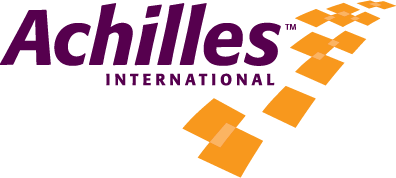
Best Practices for Making Your Race More Accessible
Think about the first race you participated in, whether it was a World Marathon Major or a local Turkey Trot. Can you remember any details about the registration process or what information you received before the race? How did you feel at the start line? What were the crowds like? What was your finish line experience?
Achilles International is here to help make that process as accessible as possible so that athletes with disabilities (AWDs) reach the start line and have a great experience. If you don’t see yourself represented, you don’t start.
On June 10, 2025 we hosted a webinar with Running USA entitled, “Best Practices for Making Your Race More Accessible.” The key for a race director in making AWDs feel welcome is often as simple as taking the time to ask: Are you an athlete with a disability? When a registration form includes that type of question, it begins a conversation to opening your race up to more audiences and more finish line memories.
Find an outline of key considerations below to keep in mind for your race and tangible strategies to help you create a welcoming experience for athletes with disabilities. For more information, contact Kathryn Chu, VP, U.S. Programming at kchu@achillesinternational.org.
Accessible Registration
Make sign-up easy for all athletes, including those using assistive technologies or requiring accommodations like guides.
Provide an opportunity to identify as having a disability and the mode of participation
Ensure forms and webpages are accessible
Provide an opportunity for athletes with disabilities to request guide runners
Create a dedicated page on your website that provides resources for AWDs
Complimentary guide runner policy
Provide clear email communication on AWD accommodations
Start Line Logistics
Consider corrals, announcements, and pre-race accommodations that mindfully incorporate accessibility into the run-of-show. Additional considerations include:
Race provided transportation
No steps in the start area
Accessible bathrooms
ASL interpreters
Equipment/baggage check
AWD start area
Staff/volunteer education on accommodations
Earlier start time
Race Course & Support
Review the guide runner infrastructure, policy and safety for wheeled participants. Considerations include:
Terrain - cobblestones, sand, steps
Earlier start for wheelers
Turn radius for wheelers
Halfway guide exchange
Accessible bathrooms on the course
Mechanical support
Finish chute etiquette
Finish Line & Post-Race
Consider finisher flows, post-finish reunion area for equipment and caregiver needs. Considerations include:
Recovery area for wheelers or AWD
Equipment/baggage pick up
Accessible bathrooms
Similar offerings at AWD post finish
Caregiver access
ASL interpreter
Visible signage
Including AWDs into awards
Staff & Volunteer Training
Include AWD etiquette into pre race volunteer webinars
Provide opportunities for people with disabilities to support
